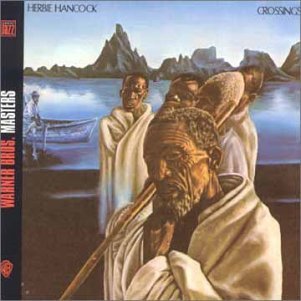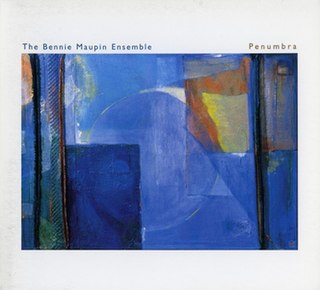
Head Hunters is the twelfth studio album by American pianist, keyboardist and composer Herbie Hancock, released October 26, 1973, on Columbia Records. Recording sessions for the album took place in the evening at Wally Heider Studios and Different Fur Trading Co. in San Francisco, California. The album was a commercial and artistic breakthrough for Hancock, crossing over to funk and rock audiences and bringing jazz-funk fusion to mainstream attention, peaking at number 13 on the Billboard 200. Hancock is featured with woodwind player Bennie Maupin from his previous sextet and new collaborators – bassist Paul Jackson, percussionist Bill Summers and drummer Harvey Mason. The latter group of collaborators, which would go on to be known as The Headhunters, also played on Hancock's subsequent studio album Thrust (1974). All of the musicians play multiple instruments on the album.

Bennie Maupin is an American jazz multireedist who performs on various saxophones, flute, and bass clarinet.

Sextant is the eleventh studio album by Herbie Hancock, released in 1973 by Columbia. It is the last album with the Mwandishi-era sextet featuring saxophonist Bennie Maupin, trumpeter Eddie Henderson, trombonist Julian Priester, bassist Buster Williams and drummer Billy Hart. Synthesizer player Patrick Gleeson and percussionist Buck Clarke also appear.

Mwandishi is the ninth album by jazz pianist Herbie Hancock, released in 1971. It is the first album to officially feature Hancock’s ‘Mwandishi’ sextet consisting of saxophonist Bennie Maupin, trumpeter Eddie Henderson, trombonist Julian Priester, bassist Buster Williams and drummer Billy Hart.

Thrust is the fourteenth studio album by American jazz-funk musician Herbie Hancock, released in September 1974 on Columbia Records. The album reached No. 2 on the Billboard Top Soul Albums chart and No. 13 on the Billboard 200 chart. It is the second album featuring The Headhunters: saxophonist Bennie Maupin, bass guitarist Paul Jackson, drummer Mike Clark and percussionist Bill Summers.

Crossings is the tenth album by jazz pianist Herbie Hancock, released in 1972. It is the second album in his Mwandishi period, which saw him experimenting in electronics and funk with a sextet featuring saxophonist Bennie Maupin, trumpeter Eddie Henderson, trombonist Julian Priester, bassist Buster Williams and drummer Billy Hart. The album is the band's first to feature synthesizer player Patrick Gleeson. He was scheduled to "set up his Moog for Hancock to play." However, Hancock was so impressed with Gleeson that he "asked Gleeson not only to do the overdubs on the album but join the group."

V.S.O.P. is a 1977 double live album by keyboardist Herbie Hancock, featuring acoustic jazz performances by the V.S.O.P. Quintet, jazz fusion/ jazz-funk performances by the ‘Mwandishi’ band and The Headhunters.

Flood is the second live album, and sixteenth album overall, by American jazz pianist and keyboardist Herbie Hancock. Recorded live in Tokyo, the album was originally released exclusively in Japan in 1975 as a double LP 洪水, reads kōzui meaning flood. It features The Headhunters performing selections from the albums Maiden Voyage, Head Hunters, Thrust, and Man-Child –– with the latter album still two months away from release at the time of these concerts.

Together is a 1979 album by jazz pianist McCoy Tyner released on the Milestone label. It was recorded in August and September 1978 and features performances by Tyner with trumpeter Freddie Hubbard, flautist Hubert Laws, tenor saxophonist/bass clarinetist Bennie Maupin, vibraphonist Bobby Hutcherson, bassist Stanley Clarke, drummer Jack DeJohnette and percussionist Bill Summers.

Snakeoil is an album by the American composer and saxophonist Tim Berne released on the ECM label in 2012.

Mágico: Carta de Amor is a live album by saxophonist Jan Garbarek, guitarist Egberto Gismonti and bassist Charlie Haden recorded in 1981 and released on ECM three decades later in 2012. The album follows the trio's first two recordings Magico (1979) and Folk Songs (1981).

Rava on the Dance Floor is a live album by Italian jazz trumpeter and composer Enrico Rava with Parco della Musica Jazz Lab, performing songs by Michael Jackson recorded in Italy in 2011 and released on the ECM label.

One Is the Other is an album by the Billy Hart Quartet recorded in April and May 2013 and released on ECM March the following year. The quartet features saxophonist Mark Turner, pianist Ethan Iverson, and bassist Ben Street.

Inside Out is an album by American jazz trumpeter Eddie Henderson recorded in 1973 and released on the Capricorn label.

Realization is the debut album by American jazz trumpeter Eddie Henderson recorded in 1973 and released on the Capricorn label.

Mahal is an album by American jazz trumpeter Eddie Henderson. It was recorded in 1978, his second album released on the Capitol label.

Hommage à Eberhard Weber is a live tribute album celebrating German double bassist and composer Eberhard Weber's 75th birthday recorded by the German public broadcaster SWR in Stuttgart in 2015 featuring Pat Metheny, Jan Garbarek, Gary Burton, Scott Colley, Danny Gottlieb, Paul McCandless, with Michael Gibbs and Helge Sunde conducting the SWR Big Band which was released on the ECM label.

Imaginary Cities is a studio album by the Chris Potter Underground Orchestra recorded in December 2013 and released on ECM in January 2015, Potter's second album for the label. The ensembles features the return of his "Underground Quartet"—consisting rhythm section Craig Taborn, Adam Rogers, and Nate Smith—alongside vibraphonist Steve Nelson, bassist Scott Colley, bass guitarist Fima Ephron, and a string quartet.

Penumbra is an album by multi-instrumentalist Bennie Maupin. It was recorded in California in 2003 and 2006, and was released in 2006 by Cryptogramophone Records. On the album, Maupin is joined by bassist Darek Oleszkiewicz, drummer Michael Stephans, and percussionist Munyungo Jackson.

Early Reflections is an album by multi-instrumentalist Bennie Maupin. It was recorded in Warsaw, Poland, in September 2007, and was released in 2008 by Cryptogramophone Records. On the album, Maupin is joined by an ensemble of Polish musicians featuring pianist Michal Tokaj, bassist Michal Baranski, and drummer Lukasz Zyta. Vocalist Hania Chowaniec-Rybka also appears on two tracks. Maupin met the players while performing in Poland, and invited them to record with him.




















